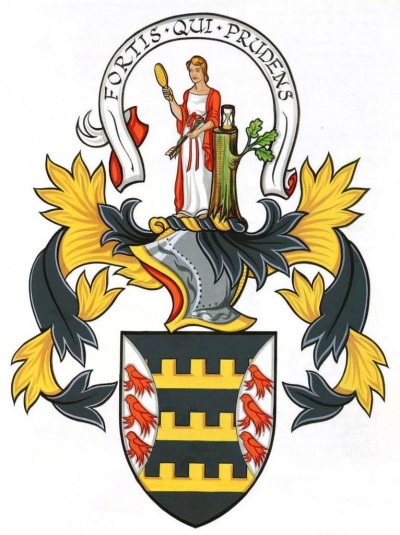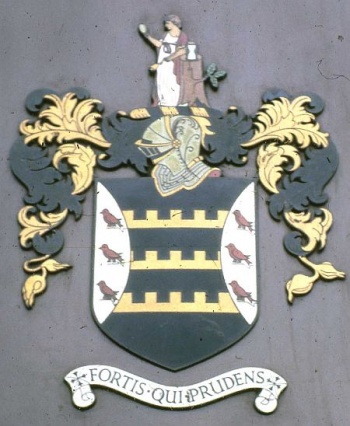Prudential Assurance Co. Ltd.: Difference between revisions
Knorrepoes (talk | contribs) m (Text replacement - "'''Motto''': " to "'''Motto''': ") |
Knorrepoes (talk | contribs) m (Text replacement - "{{uk}}''' {{uc:{{PAGENAME}}}} '''" to "''' {{uc:{{PAGENAME}}}} '''") |
||
| (6 intermediate revisions by the same user not shown) | |||
| Line 1: | Line 1: | ||
''' {{uc:{{PAGENAME}}}} ''' | ''' {{uc:{{PAGENAME}}}} ''' | ||
[[File:{{PAGENAME}}.jpg|center|400 px| | [[File:{{PAGENAME}}.jpg|center|400 px|Coat of arms (crest) of {{PAGENAME}}]] | ||
===Official blazon=== | ===Official blazon=== | ||
| Line 17: | Line 15: | ||
The three golden Bars in the Arms refer to Holborn Bars which adjoins the Head Office and is in fact the Company's postal address. In the old days the term " beyond the Bars " meant Suburbia. The bars at Holborn and the Temple represent the extra mural limits of the City of London's old jurisdiction. Beyond them the rule and protection of the City ceased. Even that limit was a concession. Normally the law stopped at the Walls, in this case at Newgate, and any buildings west were beyond the pale, and were mainly occupied by Non-Freemen. | The three golden Bars in the Arms refer to Holborn Bars which adjoins the Head Office and is in fact the Company's postal address. In the old days the term " beyond the Bars " meant Suburbia. The bars at Holborn and the Temple represent the extra mural limits of the City of London's old jurisdiction. Beyond them the rule and protection of the City ceased. Even that limit was a concession. Normally the law stopped at the Walls, in this case at Newgate, and any buildings west were beyond the pale, and were mainly occupied by Non-Freemen. | ||
The martlets or heraldic swallows are taken from the | The martlets or heraldic swallows are taken from the arms of the ancient Furnival family whose town house was on this site, and known as Furnival's Inn. | ||
The crest is the figure of Prudence, an obvious reference to both the Company's name and the principles for which it stands. The first Chairman of the Company, George Harrison, used this figure in his design of the first seal. He took the figure from the window painted by Sir Joshua Reynolds in New College, Oxford. It has been used as the Company's seal ever since. | The crest is the figure of Prudence, an obvious reference to both the Company's name and the principles for which it stands. The first Chairman of the Company, George Harrison, used this figure in his design of the first seal. He took the figure from the window painted by Sir Joshua Reynolds in New College, Oxford. It has been used as the Company's seal ever since. | ||
The up-rooted oak tree signifies strength, and the hour-glass the passing of time and the need for immediate action for the protection of the future. The arrow stresses the speed with which time passes, whilst the serpent is the sign of eternity. In Roman times it represented the Household god, thus drawing attention to one of the functions of the Company | The up-rooted oak tree signifies strength, and the hour-glass the passing of time and the need for immediate action for the protection of the future. The arrow stresses the speed with which time passes, whilst the serpent is the sign of eternity. In Roman times it represented the Household god, thus drawing attention to one of the functions of the Company - the protection of the Home. | ||
The motto may be translated as " He is strong that is prudent". | The motto may be translated as " He is strong that is prudent". | ||
{|align="center" | {|align="center" | ||
|align="center"|[[File:{{PAGENAME}}1.jpg|350 px|center| | |align="center"|[[File:{{PAGENAME}}1.jpg|350 px|center|Coat of arms (crest) of {{PAGENAME}}]] <br/>The English arms on a building ([https://www.theheraldrysociety.com source]) | ||
|} | |} | ||
{{media}} | {{media}} | ||
[[Literature]] : Main image from Lyon Court Twitter; Lawson, 1954 | [[Civic Heraldry Literature - United Kingdom|'''Literature''']]: | ||
Main image from Lyon Court Twitter; Lawson, 1954 | |||
[[Category:Corporate heraldry of the United Kingdom]] | [[Category:Corporate heraldry of the United Kingdom]] | ||
[[Category:Scotland]] | |||
[[Category:granted 1965]] | [[Category:granted 1965]] | ||
[[Category:granted 1904]] | [[Category:granted 1904]] | ||
Latest revision as of 05:07, 4 May 2024
PRUDENTIAL ASSURANCE CO. LTD.
Official blazon
- (1904)
Arms: Sable, three bars embattled Or; two staunches argent each charged with three martlets in pale gules.
Crest: On a wreath of the colours, A female figure proper, vested argent, cloaked and girdled gules, resting the sinister arm on the trunk of a tree eradicated and supporting thereon an hour-glass, and holding in the dexter hand a mirror which she is regarding and in the sinister an arrow entwined by a serpent, all proper.
Motto: Fortis qui prudens
- (1965)
Origin/meaning
The arms were officially granted on March 18, 1904 in England and on June 25, 1965 in Scotland. The Scottish grant is shown above.
The three golden Bars in the Arms refer to Holborn Bars which adjoins the Head Office and is in fact the Company's postal address. In the old days the term " beyond the Bars " meant Suburbia. The bars at Holborn and the Temple represent the extra mural limits of the City of London's old jurisdiction. Beyond them the rule and protection of the City ceased. Even that limit was a concession. Normally the law stopped at the Walls, in this case at Newgate, and any buildings west were beyond the pale, and were mainly occupied by Non-Freemen.
The martlets or heraldic swallows are taken from the arms of the ancient Furnival family whose town house was on this site, and known as Furnival's Inn.
The crest is the figure of Prudence, an obvious reference to both the Company's name and the principles for which it stands. The first Chairman of the Company, George Harrison, used this figure in his design of the first seal. He took the figure from the window painted by Sir Joshua Reynolds in New College, Oxford. It has been used as the Company's seal ever since.
The up-rooted oak tree signifies strength, and the hour-glass the passing of time and the need for immediate action for the protection of the future. The arrow stresses the speed with which time passes, whilst the serpent is the sign of eternity. In Roman times it represented the Household god, thus drawing attention to one of the functions of the Company - the protection of the Home.
The motto may be translated as " He is strong that is prudent".
| The English arms on a building (source) |
Contact and Support
Partners:
Your logo here ?
Contact us
© since 1995, Heraldry of the World, Ralf Hartemink 
Index of the site
Literature: Main image from Lyon Court Twitter; Lawson, 1954











